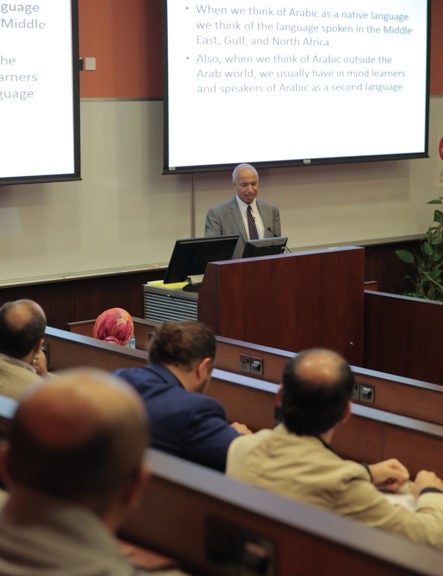Lecture Analyzes Evolution of Arabic outside Arab World

For a long time, the Arabic language spoken outside the Arab world has been overlooked as a research subject. Professor Abbas Benmamoun, vice provost for faculty affairs and academic policies at the University of Illinois, gave an analysis of this issue in a recent lecture held at Georgetown University in Qatar (GU-Q).
A scholar of linguistics specializing in comparative syntax and Arabic as a heritage language, Benmamoun gave a presentation on how Arabic is spoken as a native language in countries that are geographically located outside the Arab world. He explained the problems faced by second generation Arabs when attempting to use their dialect to study standard Arabic, especially in the United States. These children of Arab descent, called heritage speakers, speak their parent’s language as a second language after English.
“There are striking similarities between heritage speakers and native children; they both face similar problems with negation, past and future tenses,” said Benmamoun. “All this opens up a new channel to help children to improve their standard Arabic and also opens up a new method on how to use the colloquial Arabic, already acquired by the heritage speakers, to improve and facilitate their learning of standard Arabic.”
During his lecture, the scholar highlighted research conducted on varieties of the language, including endangered Arabic dialects, and Arabic varieties spoken by communities of Arab descent. To the surprise of many of the audience members who attended his lecture, Benmamoun pointed out parts of the world outside the Arab League nations where Arabic, or a localized version, has been or continues to be spoken as a native language. These countries include Malta, Southeastern Turkey, Nigeria, Chad, and Cyprus. The lecture also shed light on the history of the Arabic language in many regions outside the Arab world and its influence on the languages of the Berber, Coptic, Aramaic, Kurdish, Urdu, Hindi, and Persian cultures due to population movement over the last 15 centuries.
Benmamoun has a number of research interests including syntax, morphology, Arabic, Semitic, Arabic as a heritage language, and the acquisition of Arabic as first and second language. The scholar, who earned his Ph.D. from the University of Southern California, has authored or co-authored multiple publications on Arabic linguistics and Arabic syntax.